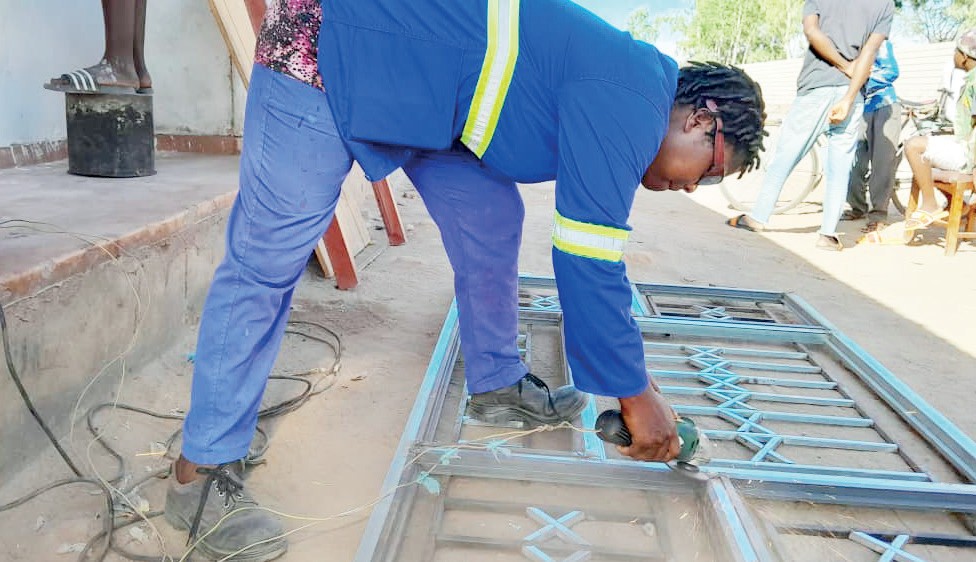Tevet skills transform lives
It is morning in Mgundaphiri Village, Traditional Authority Mponda in Mangochi District. But already, the village is bustling with activities.
One of the villagers ready to get down to work is 36-year-old Esther Mambo, a mother of two.

Under the sun, she welds metal with expert precision. Her Emmanuel Welding Shop has become a symbol of transformation, both for her family and the community.
Mambo is one of many young Malawians whose lives have changed for the better thanks to the Technical, Entrepreneurial and Vocational Education Training (Tevet).
Trained in fabrication and welding at Mangochi Community Technical College in 2018, Mambo recalls the hardships she went through before her training.
“I had nothing to do. Life was tough,” she says, pausing to adjust her protective goggles.
“But Tevet gave me a skill and now I can feed my children, support my husband and even dream bigger,” says the soft-spoken middle-aged woman.
Although she did not benefit from any startup tool package, Mambo’s determination pushed her to open the shop. She now envisions turning the facility into a company to employ others.
Mambo’s hard work and determination goes beyond villages of Mangochi.
Building a future from brick and mortar
Another story of resilience and hope is that of Zuze Tchale, 30-year-old bricklayer also living in Mgundaphiri Village.
Originally from Chikwawa, Zuze trained at Lilongwe Technical College in 2014 through the government bursary programme that is funded by employer-paid Tevet levy and managed by Teveta.
Although he left the programme at Level II for personal reasons and did not receive startup tools, Tchale credits Tevet for giving him a second chance at life.
“Before acquiring skills in bricklaying, I was just sitting at home, with no purpose. Now, I have a skill I can use to build my life and others,” he boasts.
Tchale also aspires to grow his small operations into a full-fledged construction company to offer jobs to fellow youths.
One may think the two are the only ones exuding happiness with Teveta’s vocational skills.
The truth is, there are others. In the same district at Kalonga Village in T/A Mapira, 30-year-old Chrissy Msuku is breaking barriers in what is often seen as a male-dominated trade.
A graduate of the first Teveta cohort at Mangochi Technical College in 2017, she specialised in plumbing and used her starter toolkit to launch Chrissy Plumbing Services.
Today, her company employs at least 11 people, most of them young men and women from the surrounding areas.
“Life before getting plumbing skills was hard. I had no income and I was just depending on my husband. Now, I employ others and contribute to my community,” she brags.
Msuku says her long-term dream is to formalise her company and secure government contracts.
“I want to register officially and expand. I believe women can also lead in technical trades,” she says, proudly.
Yet, in Mapira Village in T/A Mapira, Ibrahim Ali Hasan, 27, is mentoring other young people at his roadside garage.
A graduate of the 2021 parallel programme at Mangochi Community Technical College, he was trained in automobile mechanics and now runs his own workshop.
Although he didn’t benefit from any startup capital, his passion for mechanics helped him get tools bit by bit.
Hassan is now using his garage not just to repair vehicles but also as a training ground for aspiring mechanics.
“Before Tevet, life was very hard. Now, I train others and earn a living doing something I love,” he says.
Teveta’s lasting impact
The stories of Mambo, Tchale, Msuku and Hasan are just a few among thousands who have walked through the corridors of Tevet colleges and come out with more than just a certificate.
Instead, they have walked away with hope, purpose and the power to change lives.
Teveta executive director Elwin Chiwembu Sichiola acknowledges the existing challenges Tevet graduates face in seeking funding for business startup capital.
He explains: “Most Tevet beneficiaries do not have personal securities and guarantees to support their loan applications and sometimes complicated loan processing formalities tend to discourage young entrepreneurs in their first ventures from approaching banks for borrowing.
“This is why Teveta entered into agreements with financial institutions such as FDH Bank and the National Economic Empowerment Forum [Neef] to enable certified Tevet graduates to access loans at low interest rates.”
Bridging gaps
Tevet is bridging gaps by offering technical skills to the youth.
Sichiola says many young people leave school without market-relevant technical skills, as such Tevet equips them with hands-on competencies that match industry and labour market demands.
He says: “A large proportion of Malawi’s youth is unemployed or stuck in low-paying informal jobs. Tevet prepares them for formal sector jobs, self-employment, and entrepreneurship.
“Again, industries often complain that graduates lack the practical skills required for the job. Therefore, Tevet integrates work-based learning and apprenticeships to ensure training matches real-world work conditions.”





